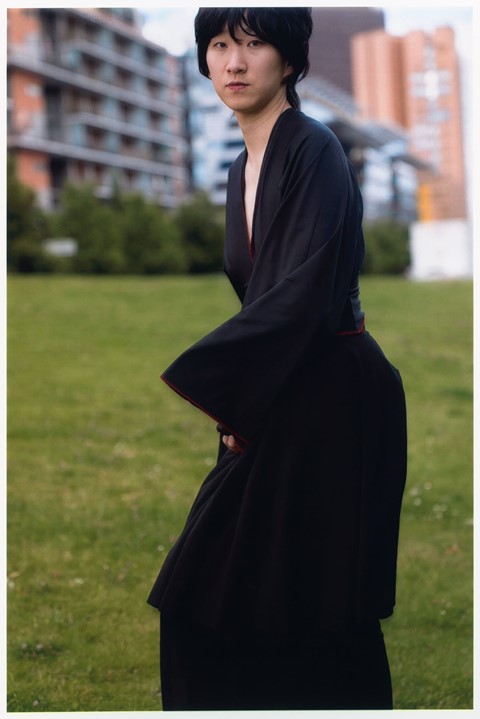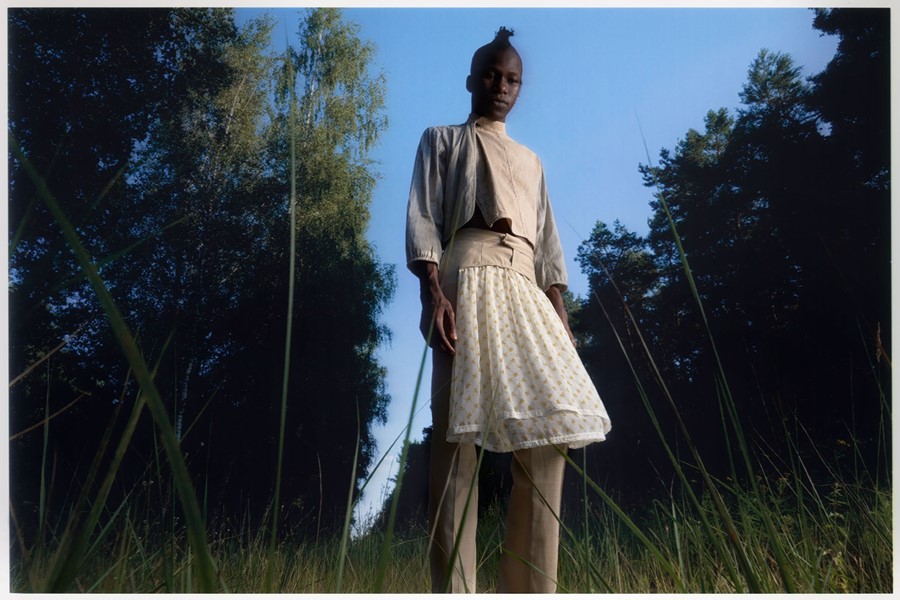Berlin-based vintage shop The Grotesque Archive sells second-hand clothing with a difference: grotesque garments by Comme des Garçons, Prada, Jean Paul Gaultier, and more
- Who is it? The Grotesque Archive is made up of duo Alienor Oran and stylist Taylor Thoroski. They stock second-hand designer clothing inspired by the grotesque
- Why do I want it? Both Oran and Thoroski stock lesser-known rare European and Japanese designers as well as brands such as Comme des Garçons, Prada and Jean Paul Gaultier
- Where can I get it? The shop is available to access through Depop or via their showroom in Berlin
Who is it? “We’re buying like maniacs because we literally cannot do anything else,” chirps Taylor Thoroski, one half of the duo behind the Berlin-based Depop shop The Grotesque Archive, over the phone. Alienor Oran, the shop’s founder and the other half of the duo pipes in, “I shop and then I take a break to read a book for a couple of hours and then shop again”. The two are currently in their studio during Berlin’s second lockdown with little to do except work. “We’re way too busy, honestly,” Thoroski says, laughing, “but just shopping all the time, I’m obsessed with it.”
In a strange twist of pandemic fate, without Covid-19 “The Grotesque” (as the duo colloquially refer to it) wouldn’t exist as it does today. From March to May 2020, Depop’s average number of active users in just the UK jumped from just under one million per month to over two million. And, trapped in the English countryside when the national lockdown hit in March, Oran had nothing else to do but concentrate on the business. She flew back to Berlin the first moment she could and Thoroski left her job as a stylist at Ssense to join her. Both now act as buyers for the shop, with Thoroski art directing and Oran managing their logistics.
Both Oran and Thoroski grew up in Canada unable to wear the kind of clothes they fawned over on blogs like Tumblr and Lookbook. Oran was in Montreal wearing her sister’s hand-me-downs and Thoroski in Toronto, where tracksuits were the uniform and anyone who deviated from the norm stuck out like a sore thumb. Despite their relative geographical proximity and shared interests, the two didn’t meet until 2017 when they found each other on Instagram.
It wasn’t until two years later that Oran came across fashion theorist Francesca Granata’s essay Mikhail Bakhtin: Fashioning the Grotesque Body. In this text Granata outlines the ways in which the idea of the grotesque has been harnessed by late 20th century and early 21st century fashion designers. Granata quotes Bakhtin: “In carnivalesque images there is so much turnabout, so many opposite faces and intentionally upset proportions. We see this first of all in the participants’ apparel. Men are transvested as women and vice versa, costumes are turned inside out, and outer garments replace underwear. The description of a charivari of the early fourteenth century … says of its participants, ‘They donned all their garments backward’”. The idea of clothing which might deform the human body, upsetting the norms of classical dress, resonated with Oran. It all finally clicked into place and the idea for The Grotesque Archive was born.
A scroll through their Depop and the reference becomes clear. There’s an AF Vandevorst black wool miniskirt, cut so that the fly sits in an unflattering bunch; a pair of white Jean Paul Gaultier jeans on which a trompe l’oeil indigo pair are printed; a Condire skirt with the back cut out to reveal a petticoat, the fabric layered in such a way as to emulate a Victorian bustle; a Comme des Garçons Autumn/Winter 1998 inside-out jacket where the intricacies of its tailoring are revealed.

Why do I want it? “I feel like there was a point where we were trying to sustain ourselves and make money,” Thoroski explains, “but now we’re just trying to find stuff that's super rare, because I feel like we have a small audience that really appreciates that”. They stock the blockbuster brands – Comme des Garçons, Yohji Yamamoto, Jean Paul Gaultier, Prada and Miu Miu – but as time goes on, they’re becoming more interested in finding designers who have been lost in the pages of recent fashion history. Thoroski and Oran want to bring smaller European and Japanese brands to the forefront. Many of these designers are often defunct, their legacy confined to the pages of the late 90s and early 00s fashion publications they also stock, a few of which include Purple, Gap Collections, Fashion 2001 Landed, Belgian Fashion Design and Libération Style.
And rare they do find: An Autumn/Winter 2005 Boudicca leather puffer jacket, a denim slash-pocket Helmut Lang jacket from 1998 (when Helmut was still by Helmut) as well as pieces from brands like Lutz Huelle, Ann-Sofie Back, 14th Addiction, Kaat Tilley and Cosmic Wonder. The list goes on and continues to grow with every drop.
In terms of expanding, Thoroski is soon releasing a book shot by Timothy Schaumburg featuring clothes from their shop and Oran has a small collection of clothing which she’s been building up over the years which she hopes one day can serve as a small research archive. But in terms of the shop itself, the two plan to keep it as it is for the moment. “Honestly I’m kind of into the fact that we shoot on an iPhone guerrilla style and sell it on Depop,” Thoroski explains, “It’s accessible, it’s quick and we have a different approach to selling than most dealers.”
Where can I get it? The shop is available to access through Depop or via their showroom in Berlin.
